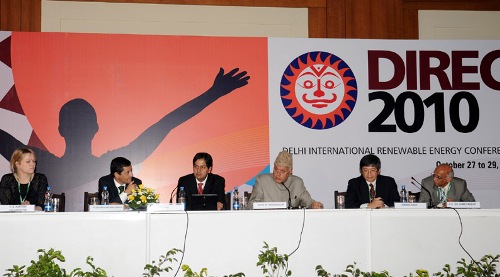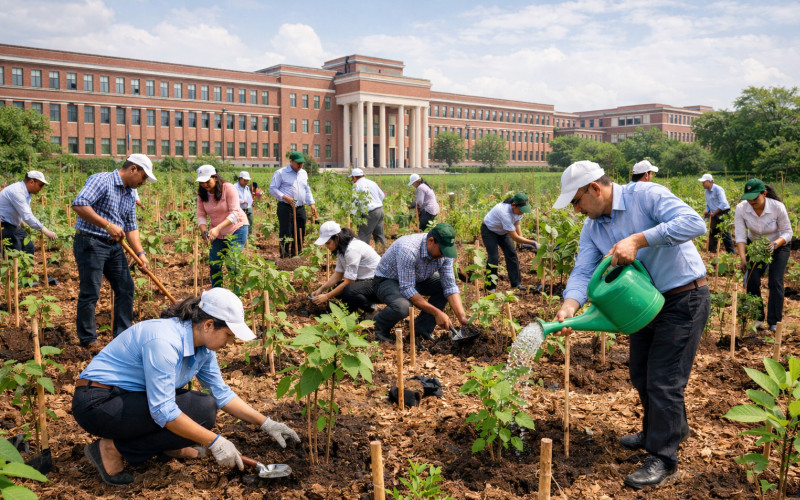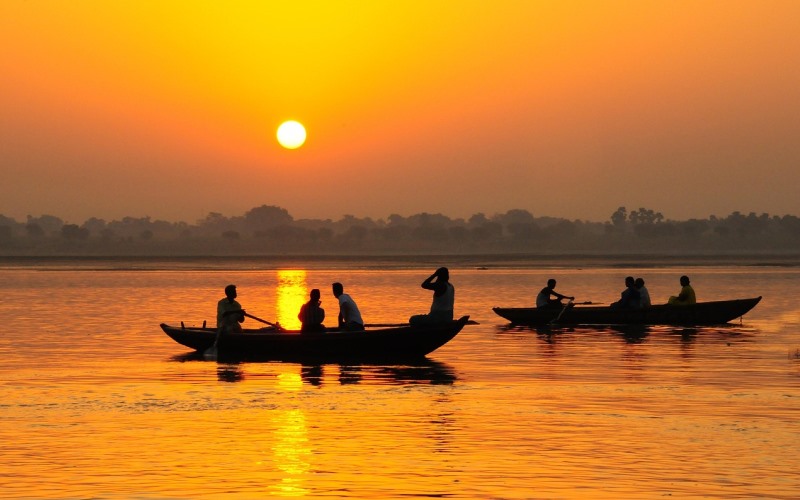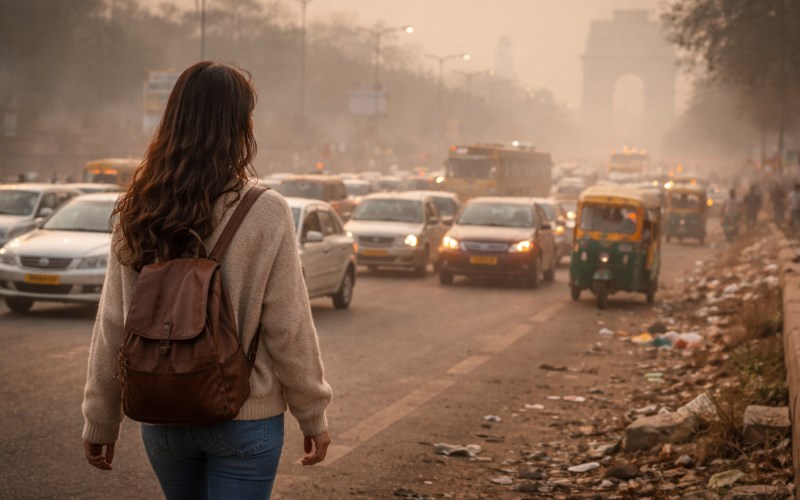
The Union Minister for New and Renewable Energy, Dr. Farooq Abdullah addressing at the DIREC, in Greater NOIDA
India is making good progress on most economic development indicators and is on its way to becoming a more developed economy in the coming years. This can also be inferred by President Obama’s recent visit to the country where he said India is not emerging but has already emerged! Fortunately, the development is now taking place keeping the environment in mind as India makes steady strides in going green in all sectors. The mainstreaming of environmentalism, something the Delhi Greens Blog has been advocating since its inceptions, is now integral to the nation’s governance, policies and acts.
During a recent AICC session, Congress party president Sonia Gandhi highlighted the importance of safeguarding the ecology by stating that it was as important as economic growth. She flagged it as “an issue of national significance”. Addressing fellow congressmen, she reminded them of what Rajiv Gandhi had advocated, “Whenever the environment is damaged, a bit of India dies”. The war on projects that trespass environmental laws and clearance requirements is gaining stronghold across all states in the country.
The Environment Ministry now has an integrated approach towards dealing with project clearance for projects dependent on coal such as thermal power, steel and sponge iron manufacturing. The ministry has no doubt got into action and put on hold clearances for all coal-dependent projects until status of environment and forest clearances for the coal supply source of domestic coal is known. Another burning issue of environmental importance is construction of dams which has been planned in many states like Andhra Pradesh, Arunachal Pradesh, Manipur and Mizoram. Over 100 dams are planned in Arunachal Pradesh alone and it has become a great issue of concern for the neighbouring ‘downstream’ state of Assam.
With a context of energy crisis and solutions for the nation, the Delhi International Renewable Energy Conference (DIREC) 2010, was hosted in October 2010 in the NCR. DIREC 2010 is a part of initiative taken at the 2002 World Summit on Sustainable Development in Johannesburg acknowledging the significance of renewable energies for sustainable development – especially for combating poverty and for environmental and climate protection. The conference saw government, private sector, and non-governmental leaders from 71 countries across the globe coming together to develop and drive new initiatives, provide insights, showcase sustainable product development and green business opportunities, and facilitate interaction between between participants. DIREC 2010 is the 4th of such conferences after Bonn in 2004, Beijing in 2005 and Washington (WIREC) in 2008.
The conference outlined the need for global leadership to ensure that the potential of renewable technologies are realized, dependence on fossil fuels is reduced and energy needs of countries across the globe are met at affordable rates. Dr. Farooq Abdullah, Union Minister for New and Renewable Energy presented the DIREC Declaration, which reads as follows:
- We acknowledge the multiple benefits provided by renewable energy. Together with energy efficiency, it provides energy access especially for the poor; creates economic and job opportunities; improves air quality and moderates climate change; and enhances energy security and sustainable development. In the last five years, the renewable energy sector has grown strongly and steadily. Even in 2009, up against strong headwinds caused by the global recession, lower oil and gas prices, and the lack of an international climate agreement, total investment has increased.
- Besides finance, the growth in renewable energy has largely been policy driven. By early 2010, more than 100 countries had some type of target and/or promotion policy related to renewable energy. In addition, adoption of renewable energy is no longer confined to the industrialized world—more than half of the existing renewable power capacity is now in developing countries.
- Despite the impressive growth in renewable energy adoption in the last five years, the challenge is that its share in the world’s primary energy supply remains small and its adoption uneven. The world has tapped only a small amount of the vast supply of renewable energy resources. For the upward trend of renewable energy growth to accelerate, technology development and policy efforts need to be taken to the next level, and large-scale private investment needs to be encouraged.
- A large proportion of the world’s population has remained without access to modern energy services for too long. Depending upon the energy source in question (electricity for lighting, modern cooking fuel, etc.) anywhere between 1.4 billion and 2.7 billion people lack modern energy services. The use of renewable energy sources will not only provide access, but also help in the eradication of poverty and in the achievement of the other Millennium Development Goals (MDGs).
- The goal enunciated by the UN Secretary General’s Advisory Group on Energy and Climate change (AGECC) of universal access to modern energy services by 2030 is commendable and should be pursued by the international community and accorded a high development assistance priority.
- We support the designation of a Year of Access and call upon the United Nations to designate 2012 as the International Year of Energy Access. We agree to work with governments, development banks, the private sector and NGOs to achieve this objective.
- In many of our countries, investments in targeted research and development in the energy sector are much lower than in other comparable sectors of the economy and incommensurate with the scale of the task at hand. We reaffirm the importance of investments in research, development and deployment (RD & D) and of international cooperation in RD & D for more cost-effective and advanced energy technologies.
- It is only by significant scaling-up of renewable energy that we will enter the virtuous cycle of cost-reductions followed by more significant scaling-up. We recognize that increasing the use of renewable energy faces several challenges but consistent and sustained government policies can and do have a favorable impact on technology deployment. Supportive frameworks, procurement policies, a level playing field, providing access to affordable long-term finance, all will help increase the uptake of renewable energy. The integration and mainstreaming of renewable energy into national sustainable development strategies for poverty reduction, agriculture, education, health and family welfare, will further provide more opportunities for scaling-up.
- We welcome and urge cooperative global action to strengthen human and institutional capacities in developing countries. Long-term strategies for capacity building are required for policy analysis and technology assessment, supporting development of technologies and related skills in sourcing, marketing, installing, operating, maintaining, and servicing renewable energy equipment and in the sharing of best practices.
- While there is no shortage of capital in the world, the challenge has always been how to scale up private investment in clean energy in developing countries. Public funds are instrumental in leveraging and incentivizing large-scale private investment in developing countries through, for example, guarantees, risk sharing, buying down interest, etc. The provision of fast-start funding in the Copenhagen Accord, as well as existing multi-lateral and national funds, could catalyze much larger private flows for clean energy in developing countries. Some of these resources should also be provided for improving access to modern energy services in rural areas of the developing world.
- We welcome the Delhi International Action Programme that encourages governments, international organizations, private companies, industry associations, and civil society organizations to take voluntary action for up-scaling renewable energy within their jurisdictions or spheres of responsibility. We request the Government of India to present an update of these voluntary actions at the next International Renewable Energy Conference to be hosted by the Government of Abu Dhabi, UAE.



